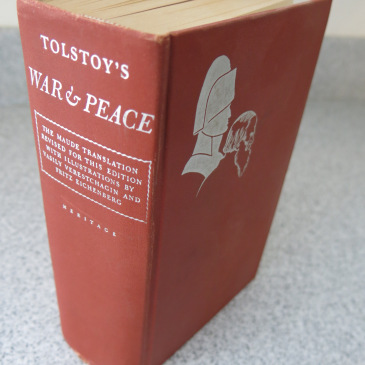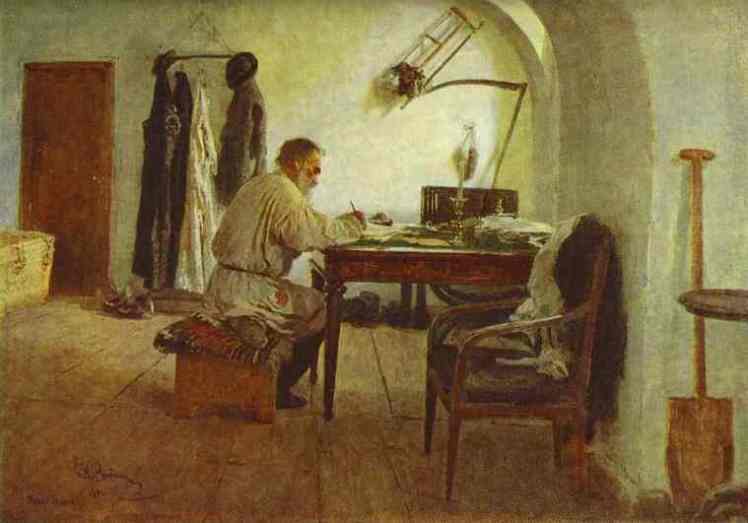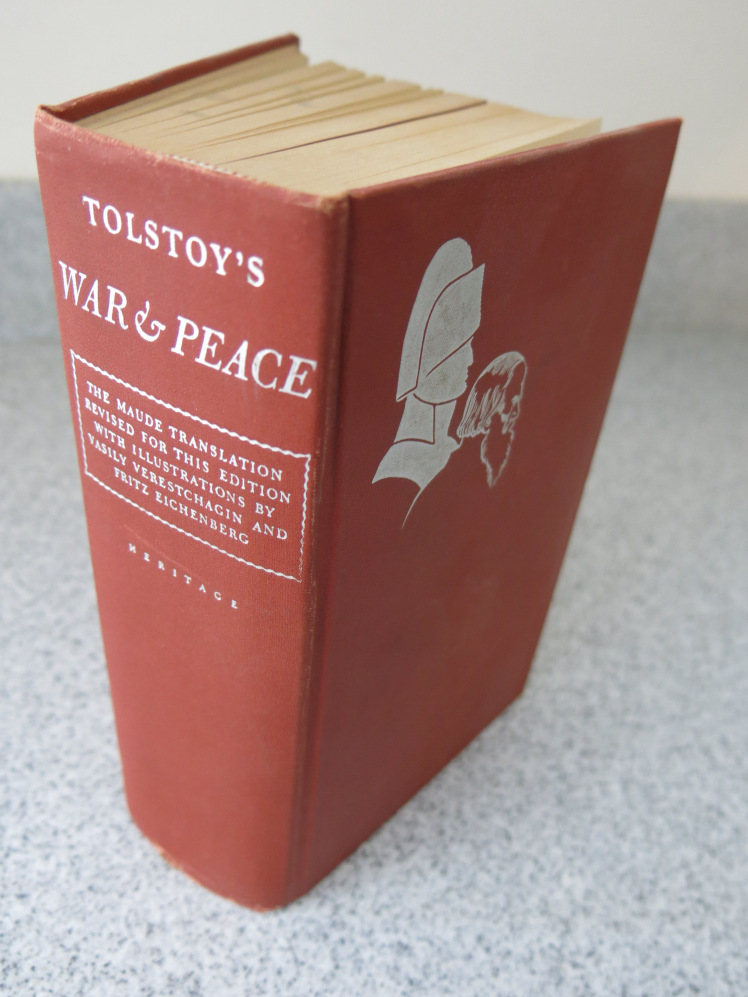
This is from 2009 or 2010 and was first published in the Raconteur magazine which grew into Wales Arts Review.

Photo by Tschäff used under Creative Commons licence https://www.flickr.com/photos/tschaff/
It’s big, it’s Russian, and in many ways is quite strange. In the words of Joseph Conrad, “It goes on and on like Texas.” Its many plots are complicated and odd. And there are whole chapters full of difficult philosophical arguments.
Of course none of these challenges will deter the determined Raconteur reader. But if you haven’t read War and Peace yet, why bother now?
Most importantly for me is that in it, Leo Tolstoy does one of the things that I most value in literature: digs behind actions to uncover the motives of men and women. One early champion, Edward Garnett (who was, by the way, Conrad’s editor, and married to one of the first translators of Russian novelists) thought that amongst all authors Tolstoy’s analysis of people’s thoughts, emotions and actions “least idealised, least beautified and least distorted” real life. Garnett reckoned that because he unveiled self-deception, “Tolstoy will stand in European literature as the conscience of the modern world.”
I think that could still be true today. Even though War and Peace features a cast of princes, Emperors, soldiers and Tsarist officials, it describes attitudes, motives and actions that are still visible today. What’s true of ambitious Tsarist courtiers is true of ambitious politicians in a modern parliament. And those who attempt to run any large corporation share the mixed motives and failures of those who led the Imperial army.
Along the way War and Peace shows us truths about the way politics works that have not changed. It shows how then as now, informal networks influence public decisions. Although it dramatises disillusion with leaders and leadership, it stands in the end for something human and humane that is still worth aiming for.
Not only that but there’s a rattlingly good story in there too.
Actually it’s a interlocking series of stories that begin in a drawing room and end in a bedroom. Between these two domestic scenes spins a kaleidoscope of people and events; battles, defeats, retreats, deaths and births, love affairs, adulterous liaisons, financial collapse and success, betrayals and rescues, taking us through the best part of two decades during a traumatic time for Russia and Europe.
The contrast between what is happening in the first and last scenes couldn’t be starker. The busy bustling of the opening soiree represents a life led in public while the dim and intimate scene of a young man waking from a bad dream with which the stories end, is as private as can be.
But there’s a further, more dramatic difference between the two worlds on display at either end of this massive novel. Quite simply the first is shown be a sham. What goes on in the salon is smooth, slick politicking and play-acting compared to the humane priorities embraced by the surviving characters at the end of the novel.
And along the way Tolstoy forces us to face up to the reality of public life – the mixed, sometimes downright immoral motives that impel people to act; the contradictions, hypocrisy and lies that keep the wheels of societies spinning and the messy business of organising people whether it be armies, governments or families.
Today we call it the old boy network; Tolstoy calls it the unwritten code and he shows us how it works in the career of the young aristocrat, Boris Drubetskoy. A well-educated and well-connected young man called Boris rapidly rising through political and social ranks. Sound familiar?
At the Emperor’s headquarters in the field, Boris is looking for a nobleman he knows to try to win whatever promotion he can. He finds the nobleman, Prince Andrei, listening dutifully but contemptuously, to an elderly Russian general. In a role reversal, the general – old, well respected and many military ranks higher than the Prince - is forced to run after the aristocrat whose disdain turns into a bright smile for Boris – a man of his class.
It is at this moment that Boris grasps the unwritten code that is the making of him, realising that whom he knows in life counts for more than official army ranking.
In turn, Prince Andrei takes up Boris’ cause and helps him advance, not for disinterested reasons, but because doing so enables him to remain himself in touch with the elite.
Soon Boris has found a comfortable place for himself in the court circles directing the war, having mastered the unwritten code. He has been promoted not through effort but “simply the art of knowing how to get on with the dispensers of promotions.”
Back in the civilian world, Prince Andrei himself also benefits from the same unwritten code. When he conceives a desire to bring about social change, no more than a few conversations take him to the highest levels and within a week he’s a member of a committee drawing up a new legal code. He slips into government almost by mistake.
This stint on the lower rungs of government gives Tolstoy chance to show how politicians work. These are observations that will ring true for anyone who has anything to do with politicians, business leaders or in fact all those who succeed in public life.
They manipulate language. The statesman Speransky draws Prince Andrei into his own way of thinking, neutralising any opposition with his inclusive words: “We regard … they cannot understand us you and I …” It’s a technique still used inveigle others into agreement.
They trade in information. Boris learns this quickly and, in one episode, physically positions himself in order to overhear some new information. He lets it be known that he’s heard it early on and in this way bolsters his position. Today’s fervid whirlpool of political gossip and information sharing in corridors and tearooms, or twitter feeds and blogs, is no different.
They need to be flexible, even to the point of discomfort. Boris is hedging his bets, attaching himself to one faction within the military leadership while continuing to show respect to the Commander-in-Chief, Kutuzov. Meanwhile, the smoothest of operators, Prince Vasili executes u-turns with abandon, changing his view of Kutuzov – national saviour or national disaster – depending on the prevailing opinion.
They use what influence they have sparingly. Prince Vasili knows that if he asks too many favours for others, there’d be nothing left for him. This notion of political capital, as if power is like a limited pot of money, to be managed, invested and spent wisely, is still with us.
If War and Peace shows that people in public life can be self-serving, hypocritical and manipulative, that’s not much of a shock. But Tolstoy also dramatises the point when such self-interest can go beyond the merely distasteful.
When the desperate governor of a besieged Moscow stalls a murderous mob by handing over a political prisoner whom he presents as a scapegoat, he is at first horrified by the killing and his role in the man’s death. But he gradually comes to terms with what he’s done, firstly in purely practical terms (the mob needed someone to kill or they’d have killed him), then in political terms (the murdered man was a traitor) and then in terms of public good (despatching a spy and calming a crowd) before putting the distasteful affair completely out of his mind.
It’s no wonder the central characters, undoubtedly echoing Tolstoy’s own thoughts, experience such a sense of disillusion with those who lead them.
At war for the first time, Prince Andrei sees at first hand the messy reality of battle – the way so much happens by accident and how survivors’ accounts muddy the waters still further.
A fraught and flawed incident in an early battle results in partial success, but also the loss of two guns. Prince Andrei has seen the battery, under the brave command of one Tushin, performing heroically. This Tushin, however is nearly hung out to dry over the guns’ loss in the battle’s post mortem when other staff officers lie about their own actions or absences.
Even one of the more morally responsible characters is guilty of this sort of embellishment. Nikolai Rostov sustains a wound by accident but on retelling how he was injured, finds himself “imperceptibly, unconsciously and inevitably” passing into falsehood.
He could not tell them simply that they had all set out at a trot, that he had fallen off his horse, sprained his arm and then run from the Frenchmen into the woods as fast as his legs would carry him.
It may be nothing more than romantic embellishment by one young soldier, but to Tolstoy, it’s how the larger lie of warfare begins and he’s determined to strip it away.
As an idealist who’s immersed himself in the political world, disillusion hits Prince Andrei hard. It happens when all around him are discussing and analysing remarks by the Emperor, scrutinising them for their real meaning.
A very simple thought occurred to him(Prince Andrei): ‘What is it to me and Bitsky – what is it to us what the Emperor is pleased to say in the Council. Can it make me any happier or better?’
And that’s a thought that must have occurred to anyone who follows politics, reads the newspapers or ploughs through memoirs, policy documents, blogs and interviews. What does it matter? Does it make me any happier or better?
In the end, what seals Prince Andrei’s loss of faith in the religion of politics is Speransky’s laughter. He’s idolised the statesman, admired his reforms and his political adroitness. Finally invited to Speransky’s home, seeing the great man laughing and joking as he relaxes with his cronies is a major disappointment.
I know what he means. It can be a shock to hear the crude terms used in private by one politician about another. For Prince Andrei, it’s too much, diminishing the statesman into just another man.
But then everyone in public life is driven by private motives. An unnamed general has a single aim:
… that he, an exemplary officer with twenty-two years’ service who had never incurred a reprimand, should not be held to blame.
In other words, the simplest of motives and recognisable to anyone involved in any organisation: not glory, not nation – just covering his back.
Each decision Prince Andrei makes is guided by the belief that only he can save the army, acknowledging, “all I care for is fame and the affection of my fellow men.” Nikolai Rostov is at first driven by adulation of the Tsar and later a sense of injustice. Pierre, illegitimate and awkward, tries marriage, drinking and even Freemasonry to help him find a place in the world.
But disillusionment is a stage on the path to enlightenment – and there’s more to come. Because Tolstoy thinks leadership is pointless anyway. Historic and social forces shape themselves.
It’s like men hauling a log. All have contributed; all have made it happen. But one of the men has done less because throughout the exertion, he’s talked most. And later he talks up his role. This for Tolstoy is the reality of leadership.
As far as he’s concerned, there’s no bigger myth than that of military genius. Generals can’t possibly know what’s going to happen in any battle and yet still they plan.
Prince Andrei listens to the commanders argue fruitlessly about tactics until it is impossible for a conclusion to be reached. Furthermore he realises there are too many variables – the weather, information that is or isn’t communicated, the bravery or cowardice of a single soldier. No commander is a military genius apart from in hindsight.
What’s more a military leader “never finds himself at the beginning of an event” but instead has to make decisions and plans in the midst of a series of shifting and often chaotic circumstances.
And a leader is surrounded by a complex network of other commanders eyeing up the top job and driven by their own motives. In War and Peace the commander in chief Kutuzov has to cope with sniping and undermining from all the generals not to mention the Tsar.
For commanders read ministers, bankers, and managers. In fact administrators of all kinds are like pilots of boats, imagining their efforts guide the boat when in fact they’re merely clinging to it. A storm removes the illusion of guiding a boat, just as, say, a financial crisis can remove the illusion of guiding an economy or a bank.
As a result of all this, Tolstoy calls for a new way of describing the actions of human societies – one that ignores kings, ministers and generals and focuses instead on all those who participate. But the problem is that
The historians go on to study those personages in history who have left the greatest number of memorials behind them: kings, ministers, generals, authors, reformers, popes and journalists…
In other words, those who talk the most when the log is being hauled and not those who did the hauling are too often those remembered. I note uncomfortably that journalists are included in the list of those who make the most noise.
But don’t think that it’s all big themes and big thoughts. Tolstoy serves up a feast of vivid characters and striking images. And, even in translation, you can relish the details and vignettes.
Dazed and confused, a French prisoner’s only concern is not what happens to him, “but don’t let any harm come to my little horse.” All you need to know about a group of politicians is that they have “plump fingers and resolute gestures and voices.” Napoleon’s vast army is a lump of snow that just melts away.
An old oak tree is seemingly dead. But a few days later it’s bursting with life and new leaves, just as Prince Andrei has begun to re-awaken after falling in love with Natasha.
This is my own favourite. Prince Andrei is at a ball. It’s the first time Natasha has appeared décolleté and he can’t help comparing her to Boris’ beautiful but unfaithful wife Hélène. Natasha’s
thin bare arms were not beautiful compared to Helene’s… But Helene seemed, as it were, covered with the hard polish left by the thousands of eyes that had scanned her person …
War and Peace is difficult to read in many ways but it’s extremely rewarding and if I’ve done anything to convince you to give it a chance let me also offer my advice to help you.

This photo by Lianna Davies used under Creative Commons licence Liahttps://commons.wikimedia.org/wiki/File:War_and_Peace_book.JPG
My best tip is to read it at a gallop. It’s a huge novel and best consumed quickly. You can probably read fifty pages a day, which means you’ll manage it within a month. If you leave it too long it can slip from your grasp.
Reading quickly is easier with a translation. I don’t feel the need to dwell on every word. You can still get a sense of Tolstoy’s style and imagery, even if it as through a glass darkly. It’s either that or learn Russian.
You may struggle with some of the philosophical bits but you can’t separate them from the stories because Tolstoy didn’t think of War and Peace as a novel. Where the real difficulty lies for we lazy modern people is with the second part of the Epilogue – the last forty pages or so. This is where Tolstoy expands in detail his thought and logical reasons for his arguments.
The stories have come to an end; this is tough going and like a credit card bill you resent it for lingering after the fun is over. It’s tempting to skip it.
Here’s my best tip for you. Read it early on when your enthusiasm’s strongest. It’ll inform your understanding of the events, it won’t sap your energy, it won’t leave you thinking Tolstoy is boring and most importantly, you can finish at the end of the action and still say you’ve read the whole book.
It’s worth it because there are profound lessons that are as valid to us as they were to nineteenth century Russians. Tolstoy strips away the pretentions of leaders both military and political to show a reality that can be heroic in its humanity. It’s why Tolstoy can still be the conscience of the world.